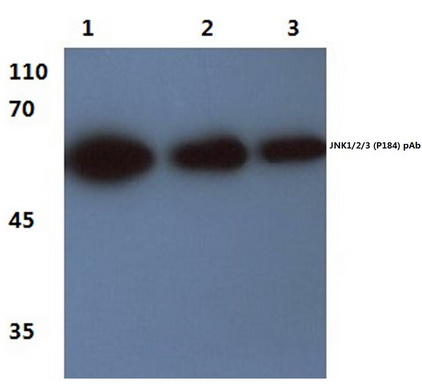JNK1/2/3 Rabbit Polyclonal Antibody
Specifications
| Product Data | |
| Applications | IF, IHC, WB |
| Recommended Dilution | Western blot: 1/500-1/1000. Immunohistochemistry on paraffin sections: 1/50-1/200. Immunofluorescence: 1/50-1/200. |
| Reactivities | Human, Mouse, Rat |
| Host | Rabbit |
| Clonality | Polyclonal |
| Immunogen | Synthetic peptide, corresponding to amino acids 150-200 of Human JNK1. |
| Specificity | This antibody detects endogenous levels of JNK1/2/3 protein. (region surrounding Thr178) |
| Formulation | Phosphate buffered saline (PBS), pH 7.2. State: Aff - Purified State: Liquid purified Ig fraction Preservative: 0.05% sodium azide |
| Concentration | 1.0 mg/ml |
| Purification | Affinity-chromatography using epitope-specific immunogen and the purity is > 95% (by SDS-PAGE) |
| Conjugation | Unconjugated |
| Storage | Store undiluted at 2-8°C for one month or (in aliquots) at -20°C for longer. Avoid repeated freezing and thawing. |
| Stability | Shelf life: one year from despatch. |
| Predicted Protein Size | ~ 46, 54 kDa |
| Background | c-Jun N-terminal kinases (JNKs) phosphorylate and augment transcriptional activity of c-Jun. JNKs originate from three genes that yield 10 isoforms through alternative mRNA splicing, including JNK1α1,JNK1β1, JNK2α1, JNK2β1 and JNK3α1, which represent the p46 isoforms, and JNK1α2, JNK1β2, JNK2α2, JNK2β2 and JNK3β2, which represent the p54 isoforms. JNKs coordinate cell responses to stress and influence regulation of cell growth and transformation. The human JNK1 (PRKM8, SAPK1, MAPK8) gene maps to chromosome 10q11.22 and shares 83% amino acid identity with JNK2. JNK1 is necessary for normal activation and differentiation of CD4 helper T (TH) cells into TH1 and TH2 effector cells. Capsaicin activates JNK1 and p38 in Ras-transformed human breast epithelial cells. Nitrogen oxides (NOx) upregulate JNK1 in addition to c-Fos, c-Jun and other signaling kinases, including MEKK1 and p38. JNK3 (MK10, MAPK10, PRKM10) is activated by pro-inflammatory cytokines and environmental stresss by phosphorylating transcription factors such as c-Jun and ATF2. This is important for AP-1 transcriptional activity regulation. JNK3 is crucial for neuronal apoptosis (stress-induced). |
| Synonyms | JNK1, JNK-46 PRKM8, SAPK, JNK-1, MAPK-8 |
| Reference Data | |
Documents
| Product Manuals |
| FAQs |
| SDS |
{0} Product Review(s)
0 Product Review(s)
Submit review
Be the first one to submit a review
Product Citations
*Delivery time may vary from web posted schedule. Occasional delays may occur due to unforeseen
complexities in the preparation of your product. International customers may expect an additional 1-2 weeks
in shipping.






























































































































































































































































 Germany
Germany
 Japan
Japan
 United Kingdom
United Kingdom
 China
China



